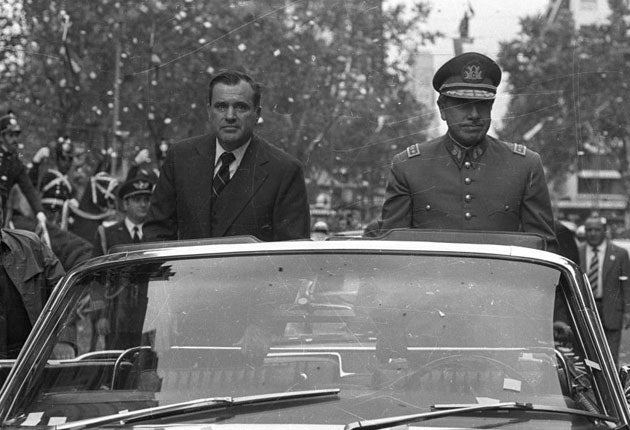Juan Maria Bordaberry: Uruguayan politician whose concessions to the military led to a 30-year sentence for human rights abuses

Your support helps us to tell the story
From reproductive rights to climate change to Big Tech, The Independent is on the ground when the story is developing. Whether it's investigating the financials of Elon Musk's pro-Trump PAC or producing our latest documentary, 'The A Word', which shines a light on the American women fighting for reproductive rights, we know how important it is to parse out the facts from the messaging.
At such a critical moment in US history, we need reporters on the ground. Your donation allows us to keep sending journalists to speak to both sides of the story.
The Independent is trusted by Americans across the entire political spectrum. And unlike many other quality news outlets, we choose not to lock Americans out of our reporting and analysis with paywalls. We believe quality journalism should be available to everyone, paid for by those who can afford it.
Your support makes all the difference.Although he was the elected civilian president of Uruguay in the 1970s, Juan María Bordaberry bowed to pressure from the military and agreed to what South Americans call an autogolpe, a self-imposed coup d'état against his own government, turning himself overnight into a dictator. On 27 June 1973, citing the threat of "Marxist subversives," notably the country's Tupamaro guerrillas, he dissolved the legislature, declared all political parties illegal and gave the military greater powers to lock up, torture and even murder leftist opponents. His model, he said, was a franquista system, based on that of General Francisco Franco in Spain.
Bordaberry (the name is of Basque origin), who has died under house arrest while serving 30 years for human rights abuses and violating the constitution, later became part of Operation Condor – a collaboration between South America's military regimes aimed at eradicating socialist or communist influence, be it from guerrillas, students, trade unionists or whomever. Troops, police or intelligence agents were allowed to cross one another's borders to "deal with" their own nationals who had fled to what they thought was safety. They were invariably kidnapped, tortured and "disappeared."
If they had young children, these were often taken away for adoption, some by military families. (Uruguay's current president José Mujica, aformer Tupamaro guerrilla, announced last month that such cases would be reinvestigated using a new genetic database).
Bordaberry's role never received the same worldwide publicity as the excesses of his allies – Augusto Pinochet of Chile or the various Argentinian military leaders of the 1970s and '80s. "Only" some 200 Uruguayans were kidnapped and killed by their own security forces during the military rule initiated by Bordaberry in 1973 and which lasted until 1985. He himself had already been ousted by the military by 1976. In all, Condor was responsible for tens of thousands of deaths throughout South America, half of them in Argentina whose population at the time was eight times that of Uruguay. In addition to Uruguay, Chile and Argentina, the operation included the military governments of Brazil, Paraguay and Bolivia, with the CIA very much "in the loop," at the very least in an advisory capacity.
After the generals tired of Bordaberry in 1976 and replaced him with another civilian figurehead, Alberto Demicheli, Bordaberry disappeared from public view, apparently returning to farming on his rural ranch. There he remained for 30 years until Uruguay's first left-wing government, headed by president Tabaré Vázquez, began in 2006 to look back at human rights abuses during the dark days of the military regimes.
A judge ordered Bordaberry's arrest in November 2006 for the killing of four Uruguayans who had fled to Argentina, including two congressmen and a suspected guerrilla called William Whitelaw, as well as the murders of 10 other leftists who had been abducted in Uruguay itself. He was sentenced in February 2010 to 30 years in prison on an all-encompassing charge of abusing human rights by violating the constitution through the 1973 coup. Due to ill-health he had been allowed to remain under house arrest since 2007 in his son's home, where he died. His family insisted he was a victim of vindictiveness by the Frente Amplia [Broad Front] coalition of centre-left parties, unions and social movements that has governed Uruguay since 2005.
Juan María Bordaberry Arocena was born in the Uruguayan capital, Montevideo, in 1928 to a wealthy family of cattle and sheep ranchers, traditionally part of the country's élite. His father was a lawyer but became a powerful landowner, which helped him win a seat in the national Senate on behalf of the Colorado (literally "coloured" but meaning "red") Party, one of the country's big two. Domingo's own father, Santiago, had emigrated in the late 19th century from Bordaberry near Hendaye in the French Basque country (The surname is more common as Bordaburu on the Spanish side of the Pyrenées).
In 1962, Bordaberry followed in his father's footsteps by becoming a Senator for the Colorado Party and in 1969 was appointed agriculture minister in the government of President Jorge Pacheco. In late 1971, hand-picked by the outgoing Pacheco, Bordaberry narrowly won the presidential election and took office on 1 March 1972.
Uruguay was in recession, inflation was more than 20 per cent and theTupamaro guerrillas, who had been active for a decade, though declining, still posed a threat. When in June1973 the military decided Bordaberry had not done enough, they made him an offer he couldn't refuse –and he accepted the role of dictator rather readily.
One of his sons, Pedro Bordaberry, is now a Senator, and leader of the Colorado Party.
Juan María Bordaberry, rancher and politician: born Montevideo 17 June 1928; married Josefina Herrá* Puig (seven sons, two daughters); died Montevideo 17 July 2011.
Join our commenting forum
Join thought-provoking conversations, follow other Independent readers and see their replies
Comments